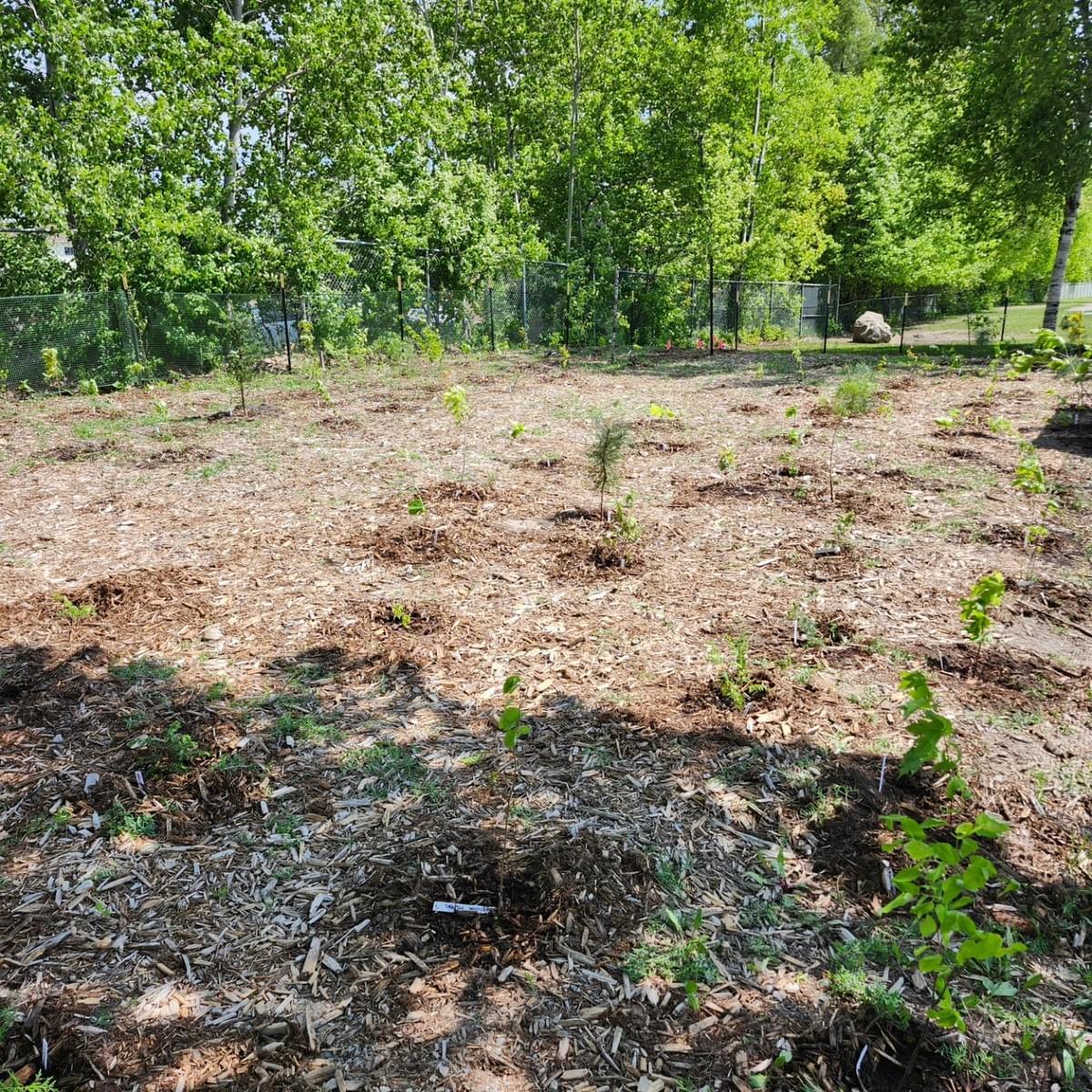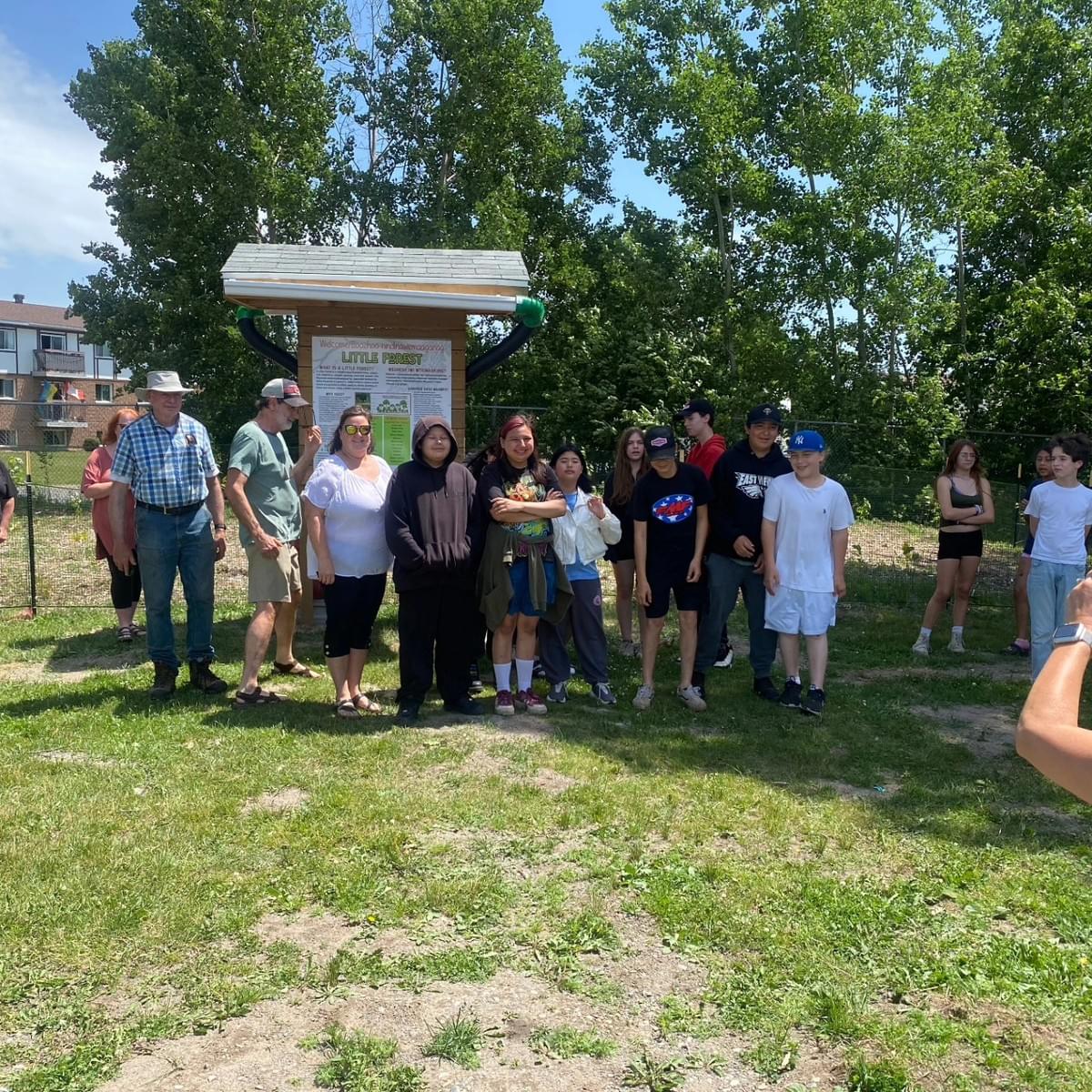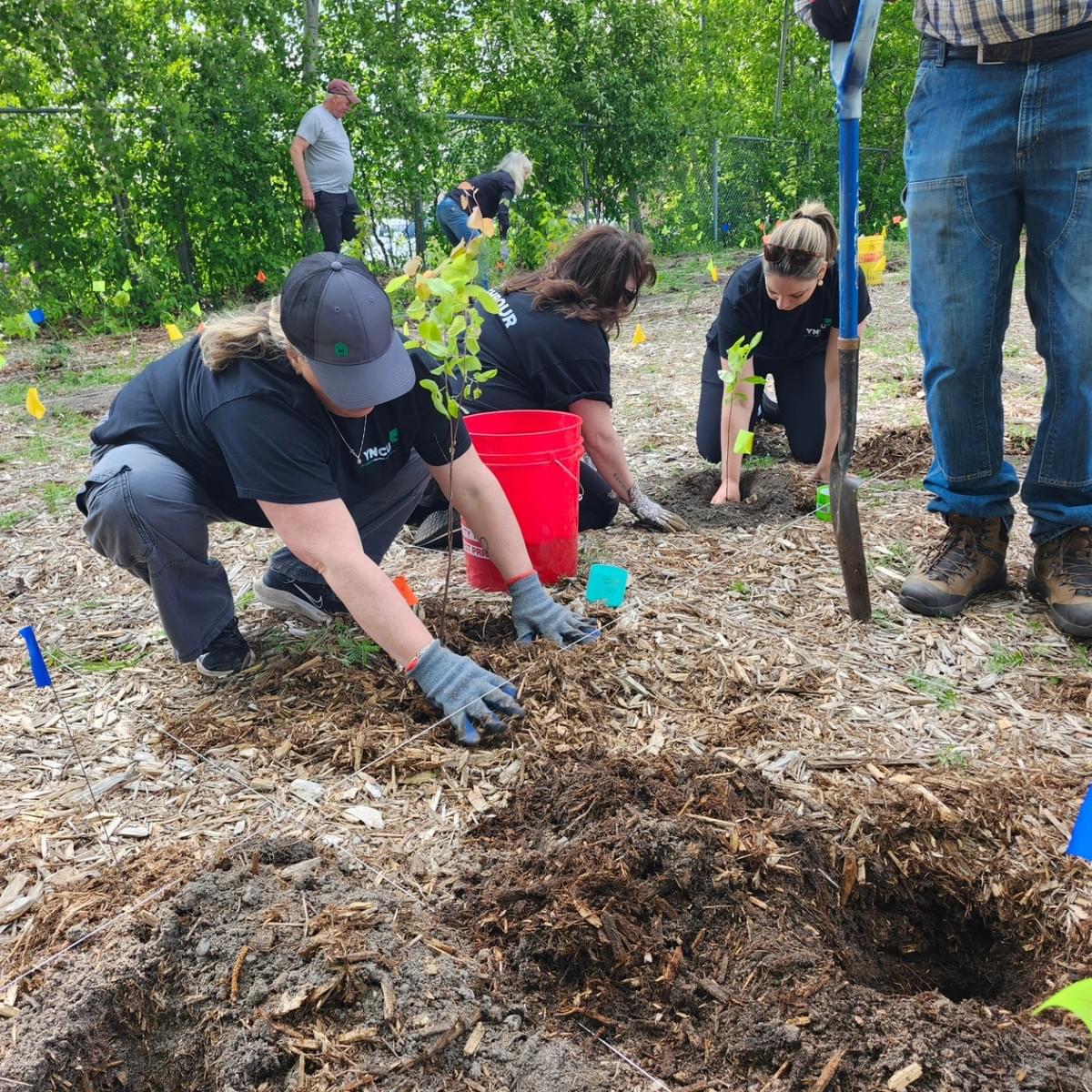Amid vanishing greenspace and growing ecological urgency, one grassroots project in Northern Ontario is planting hope and watching it grow.
This spring, the Sault Climate Hub launched its first Little Forest at East View Public School in Sault Ste. Marie, kicking off a long-term community greening initiative that blends climate action with hands-on learning, Indigenous-informed ecology and deep local care. The forest, just 200 square metres (the size of a tennis court!), may be small, but its roots are part of something much larger. As one of several projects led by the Hub, the project serves the purpose of fostering community connection and reflects the Hub’s mission of building a more just, climate-resilient future through education, grassroots engagement and locally anchored solutions aligned with global emissions targets.

The Sault Climate Hub successfully establishes its first Little Forest at East View Public School in Sault Ste. Marie.
What is a Little Forest?
In recent years, local residents in communities across Canada, including Calgary and Kingston, have been inspired by the Miyawaki Method, which involves planting dense, diverse mini-forests in urban spaces using native and climate-adapted tree species. Developed by Japanese botanist Akira Miyawaki, these "little forests" have demonstrated impressive results! In just a few years, these small plots can grow dozens of times faster than conventional tree-planting efforts, supporting native wildlife, cooling overheated neighbourhoods and soaking up excess stormwater from heavy rainfalls.
Naturally, Little Forests aren’t a replacement for old-growth forests. They are, however, a powerful, community-driven way to bring nature back into the everyday spaces where we live, learn and grow.
Why here? Why now?
“Sault Ste. Marie is in Northern Ontario, but we’re a very fast-growing city,” says Sandra Trainor, a member of the Little Forests project team. “It’s become very urbanized, and we’re losing a lot of our canopy cover in the city because of new developments and buildings. We thought it was important to introduce this concept to residents to see if we can reforest some of the areas that have been deforested.”
Inspired by a fall 2023 webinar with Little Forests Kingston, the Sault Climate Hub decided to take the leap and begin their Little Forests project. After successfully securing funding in early 2024, they broke ground at East View Public School, which served as an ideal location to engage students and educators in the planning, planting and care of the forest.
By May 2025, with the help of dozens of volunteers, teachers, donors and even the City of Sault Ste. Marie’s Green Initiatives Fund, more than one hundred and forty-five native and climate-adapted seedlings were planted. A month later, students, staff and community members gathered once again for a dedication and ‘unveiling’ ceremony, marking a new chapter in the school’s legacy as a steward of this living outdoor classroom.

Students, staff and community members attend the ‘unveiling’ ceremony for the Little Forest at East View Public School on June 23, 2025.
A forest for the whole community
Beyond trees, this project is about people, too.
“What we’ve seen so far is that there’s been a lot of people who are willing to take care of the forest,” Sandra explains. “It’s the school themselves who are going to be caring for it — watering, weeding, those kinds of things, during the school year — but then we also have community volunteers who have stepped forward to come in and help over the summer months and during holidays.”

Students, teachers and community volunteers participate in bringing the Hub's Little Forest project to life.
The forest is already serving as a hands-on learning site for East View students, who helped choose what trees to plant and are now using the space to learn about soil moisture, temperature and ecology through real-time monitoring. Supported by new scientific equipment funded through the project, students are building skills and environmental literacy in ways that connect the classroom to the world outside their door.
The forest is also creating new cross-sector partnerships, drawing support from public, private and grassroots contributors alike. These include Clean North, local tree growers, the Algoma District School Board and YNCU (Your Neighbourhood Credit Union), which provided both funding and eager volunteers.
Planting for the future
The success of the first Little Forest has already laid the groundwork for more of these projects. In June, the Hub began preparing the forest floor for its second planting site of 300 square metres at White Pines Collegiate and Vocational School, where hay, mulch and compost are now settling into a nutrient-rich foundation for trees to be planted in spring 2026.
By rotating between planting and prep years, the Hub plans to establish one or two Little Forests annually, as capacity and funding allow. Interest is growing, too; other schools have already expressed a desire to join the initiative by donating plots of land once resources become available.
Of course, the work doesn’t come without challenges, from navigating school board approvals to ensuring consistent care over weekends and summer breaks. Nonetheless, the Hub is committed to learning from each stage, building transparent partnerships and supporting long-term community ownership of each forest.
Not just a patch of trees
In communities across Canada and around the world, the effects of climate change and ecological degradation are becoming impossible to ignore: more frequent and intense heatwaves, increasingly destructive flooding and the alarming decline and extinction of wildlife populations. At the same time, cities are increasingly being cut off from the natural systems essential to sustaining life.
The urgency is clear. But so is the opportunity.
As the Sault Climate Hub continues to work to strengthen local capacity and shape people-powered policy change, projects like its Little Forests initiative offer something both rare and essential; namely, a vision of regeneration that is rooted in place, led by community and grounded in care.
These small but mighty forests are living demonstrations of what climate action can look like at the neighbourhood level. In a time of climate anxiety and disconnection, one Little Forest is a call back to community and a way for residents to take ownership of their environment, learn from the land and build relationships with one another across generations. By planting seeds (both literal and metaphorical), the Hub is growing not only urban forests, but a deeper sense of collective responsibility as well as a stronger foundation for long-term climate advocacy.
The forests we plant today are the legacies we leave tomorrow. And in these living, breathing patches of green, we see not only what’s possible, but also what’s necessary.
The Sault Climate Hub is always looking for volunteers to help plant, water, weed and steward the forests through their early growth. If you’re local to the area, reach out at saultclimatehub@gmail.com, or follow them on Facebook and Instagram to stay in the loop. Alternatively, if you’re looking to join or start a Hub in your area, visit climatehub.ca.